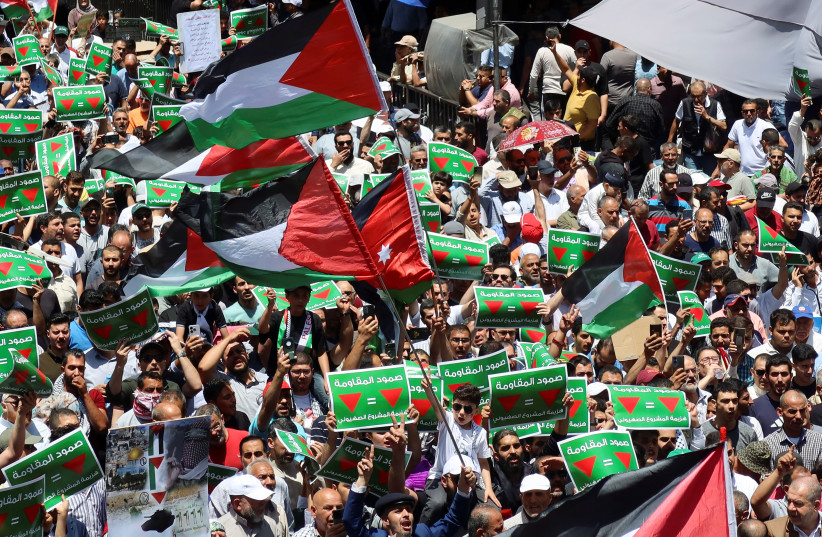Jordan celebrated Independence Day on Saturday, marking 78 years of independence from British rule. This year’s celebrations were quiet as Jordanians mourned the ongoing war in Gaza.
For more stories from The Media Line go to themedialine.org
After World War I, the Hashemite Army took over control of Jordan. Meanwhile, Britain and France drew new borders for the Middle East, with Britain ruling present-day Jordan, Israel, and the West Bank and France ruling Syria. Britain later divided the area it controlled into two parts: the area from the Mediterranean Sea to the Jordan River, called Palestine, and another area across the Jordan River, called Transjordan.
In 1921, the British put Abdullah I in power in Transjordan, and on May 25, 1946, Britain agreed to grant the state independence. It took two years for Jordan to gain full independence.
This year, Jordan is in a less than celebratory mood. The war in Gaza is now in its eighth month, upsetting many Jordanians who have Palestinian heritage or otherwise identify with the Palestinian cause.
Although Jordan has had a peace treaty with Israel since 1994, it has consistently called for the creation of a Palestinian state, James Gelvin, a professor of Middle Eastern history at UCLA, told The Media Line.

Jordan's peculiar position
“Since the breakout of this war, Jordan has found itself in a peculiar position, by being a peace partner with Israel but not accepting its military actions in Gaza and calling for a cease-fire,” Gelvin said.
Jordan’s uneasy alliance with Israel is tied to the kingdom’s identification with Saudi Arabia rather than Iran in those countries’ ongoing regional rivalry.
“This is why Jordan keeps its head down with the Gaza situation and helped shoot down drones during Iran’s attack,” Gelvin explained.
Jordanians have been frustrated with their government given the country’s poor economic situation, and the kingdom’s apparent inaction on the Palestinian issue has increased public discontent.
“The 21st century has not been very good toward the non-oil producing states as Jordan,” Gelvin said. “Inflation is rising and also unemployment. The country’s foreign policy is also beholden to outside powers such as the Saudis and the US. So for the economic favors that the country receives, it gives back political ones by granting alliances, cooperation, and so on.”
Jordanian Independence Day is normally marked with military parades, festive events, fireworks, and religious services. This year, however, the mood will be more somber.
“This year’s celebrations are just a formality, and nobody is in the mood to do something festive,” Tasneem Edwan, co-founder of ThirtySix, an Amman-based marketing company, told The Media Line. “Usually, decorations are all over the streets, people sing and dance together, traditional dishes are made, and shops offer special discounts too, but now, our brothers and sisters in Gaza are dying.”
With Jordanians less interested in going out to celebrate, the economy is suffering as well.
“The war not only affected the spirit of the Jordanians, but also the local economy, since the people have stopped doing recreational activities in their free time due to war next door,” Alaa Murad, the Amman-based Correct Marketing agency manager, told The Media Line.
She characterized the transition from big, joyful events to smaller ones, focusing on the humanitarian crisis in Gaza as a show of solidarity.
“The losses caused by the lack of advertisements for this national holiday haven’t been compensated yet, but we just hope that this war will end soon to get back on track,” Murad said.
Some smaller Independence Day events will be held in Jordan this year, including children’s celebrations featuring face painting and dabke, a traditional Levantine folk dance.
